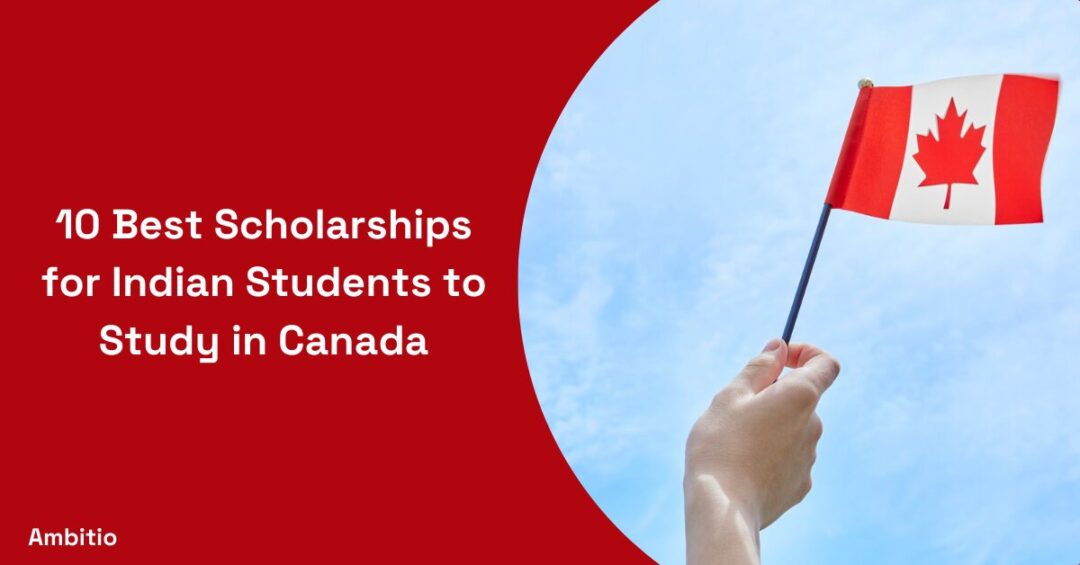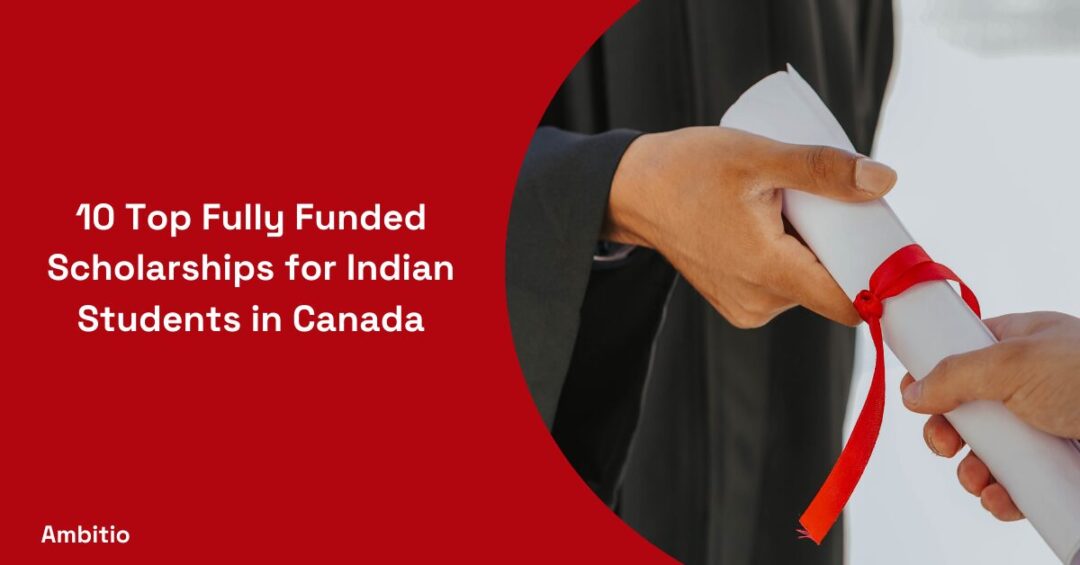2 June 2025
7 minutes read
A Complete Roadmap to the Admission Process for MS in Canada for Indian Students
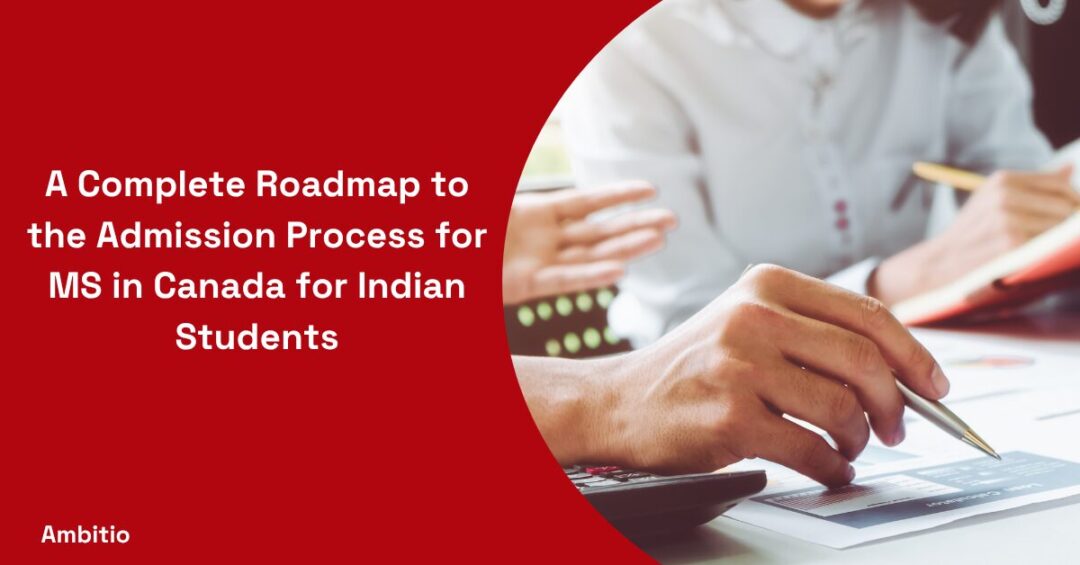
Key Takeaways
- Admission process for MS in Canada requires Indian students to meet eligibility, prepare documents, and follow strict deadlines.
- Scholarships and smart financial planning help reduce the high cost of studying in Canada.
- Platforms like Ambitio simplify your study abroad journey with expert guidance and personalized support.
Over 320,000 international students are enrolled in Canadian universities, and a huge chunk of them are Indian students eyeing a master’s degree in Canada. Yet, most get overwhelmed by confusing timelines, hidden costs, and unrealistic expectations. They Google “admission process for MS in Canada” but find recycled advice.
The truth? Studying in Canada needs planning, clarity, and brutally honest insights. This guide cuts through the fluff, built for Indian students who want real help navigating the MS journey without false promises.
Why Indian Students Prefer Canada for MS Programs?
Canada is one of the most preferred study abroad destinations for Indian students due to its top universities in Canada like McGill University and the University of British Columbia, affordable tuition fee, smooth application process, and clear eligibility criteria.
With high-quality masters programs, generous scholarship for masters in Canada, and excellent job opportunities after masters, students apply for masters in Canada to gain a globally recognized masters degree and better PR in Canada prospects after graduation.
Eligibility Criteria for Indian Students Applying to MS in Canada
The admission process for MS in Canada starts with meeting the basic eligibility criteria set by top universities in Canada for masters. Whether you’re aiming for tech-focused MS courses or the best business universities in Canada, these requirements are non-negotiable for Indian students planning to study in Canada.
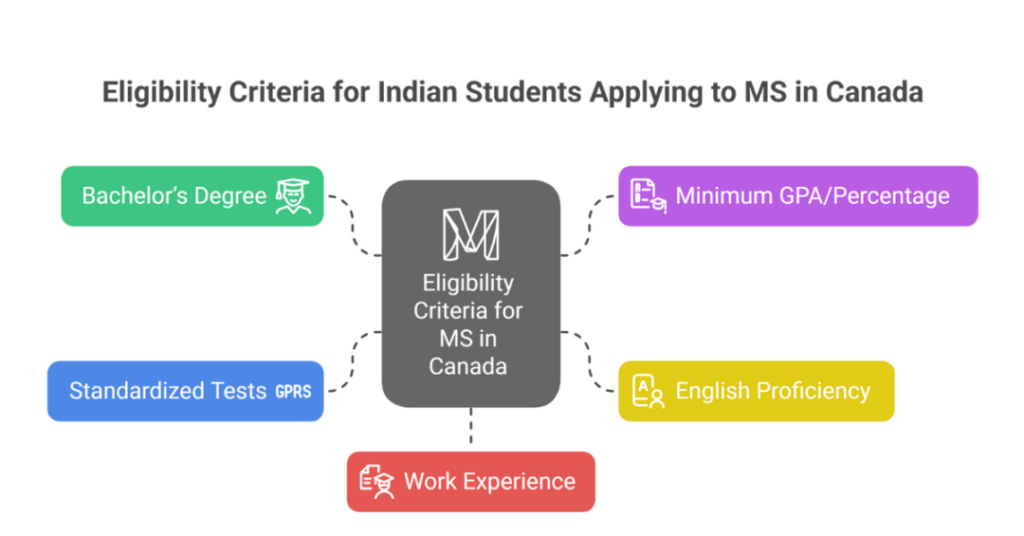
Here’s what you need to apply:
- Bachelor’s Degree: A 4-year undergraduate degree is usually required for most masters courses, including MBA in Canada and specialized MS programs.
- Minimum GPA/Percentage: A strong academic record (usually 65% or 3.0 GPA) from recognized institutions is expected, especially for top masters courses in Canada.
- English Proficiency: IELTS/TOEFL scores are required for masters in Canada, especially for students from non-native English-speaking countries.
- Standardized Tests: Some universities for masters in Canada, like McGill University or University of British Columbia, may ask for GRE/GMAT scores.
- Work Experience: For programs like an MBA in Canada, work experience may be mandatory, adding weight to your application process for MS.
With over 800,000 international students in Canada, and more Indian students choosing Canada for international education, meeting these Canada requirements is the first step toward a globally recognized masters degree in Canada.
Documents Required for MS Admission in Canada for Indian Students
For Indian students planning to pursue a master’s in Canada, submitting the correct paperwork is a critical part of the admission process for MS in Canada. Since programs in Canada are highly competitive and globally ranked in the QS World University list, your application must be complete, accurate, and timely.
Here’s the complete list of documents required for masters in Canada:
- Academic Transcripts: For your undergraduate degree, required by all universities in Canada for MS and top Canadian universities.
- Statement of Purpose (SOP): Statement of Purpose is a key document that shows your goals, motivation for pursuing a masters, and fit for the masters programs in Canada.
- Letters of Recommendation (LORs): Usually 2–3 Letters of Recommendation (LORs), from professors or employers—essential for any MS course or diploma in Canada.
- Resume/CV: Must highlight academics, internships, and work experience in Canada (if applicable).
- English Proficiency Test Scores: IELTS/TOEFL results are required for MS in Canada, especially for international students in Canada from non-English backgrounds.
- GRE/GMAT Scores: Needed for certain universities of Canada or popular masters in Canada, including MBA or college STEM program.
- Passport: A valid passport is mandatory to apply for a Canadian university and later for your Canada student visa.
- Proof of Funds: To show you can cover tuition fee in Canada, cost of masters, and cost of living in Canada as part of visa and admission processes.
- Portfolio: For creative masters in Canada for Indian students (design, architecture, etc.), a portfolio might be required.
- Application Form and Fee: Each university has its own format and deadlines. The application deadline depends on the intake (Fall/Winter/Spring).
Since students fund their studies through savings, loans, or Canada scholarships, having all these documents ready reduces stress later. Remember, students in the form of international applicants must also prepare for post-study opportunities in Canada, as students can work for 20 hours per week, and many choose to stay in Canada after completing their MS degree.
Step-by-Step Admission Process for Masters in Canada
With a rising number of international students, including a large share of Indian students, the admission process for MS in Canada has become more competitive and structured. Known for its colleges in Canada and globally ranked universities in the world, Canada offers immense opportunities after masters in Canada, but only if you follow the steps right.
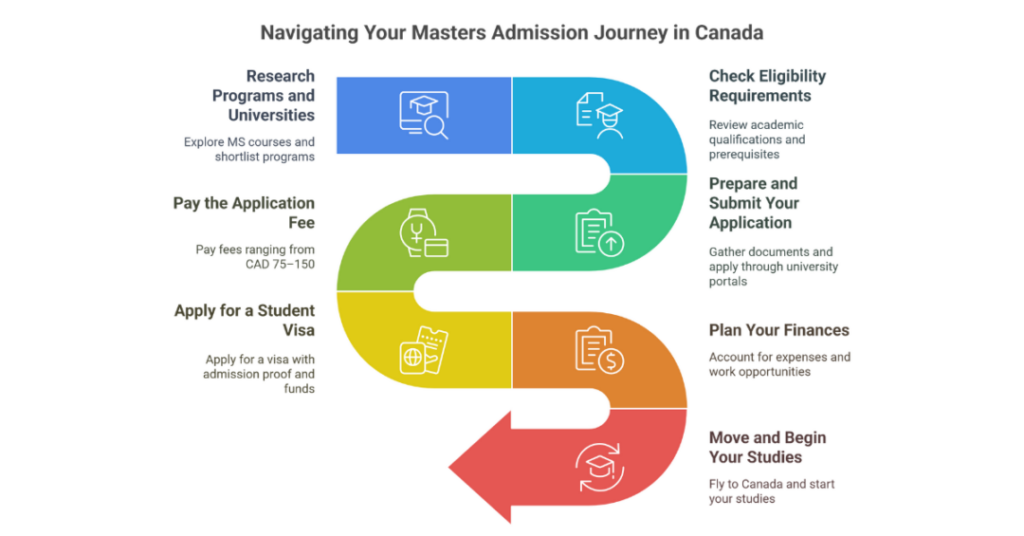
Here’s a step-by-step guide for Indian students planning to study abroad:
Step 1: Research Programs and Universities
Explore MS courses in Canada and shortlist programs based on interest, rankings, and future scope. Canada for international students offers both thesis and non-thesis tracks.
Step 2: Check Eligibility Requirements
Review academic qualifications, English test scores, and additional prerequisites on official colleges in Canada and university sites.
Step 3: Prepare and Submit Your Application
Gather SOPs, LORs, transcripts, and apply through university portals before the application deadline. Note that tuition fees for masters and required documents for masters vary by course.
Step 4: Pay the Application Fee
The fees for masters in Canada application stage range between CAD 75–150, depending on the university.
Step 5: Apply for a Student Visa
Once accepted, apply for a student visa with proof of admission, funds, and biometrics. This step is regulated by the Government of Canada.
Step 6: Plan Your Finances
Account for expenses in Canada like accommodation, books, and living costs. International students can work up to 20 hours/week to support their stay.
Step 7: Move and Begin Your Studies
Fly to Canada and begin your higher studies in Canada. Your journey in one of the best masters in Canada for international students begins here.
Success in Canada depends not just on acceptance, but preparation. Done right, you’ll access world-class education and promising opportunities after masters in Canada.
10 Top Universities and Courses in Canada to study Masters in Canada
Over the past decade, Masters in Canada has become a top choice for Indian students, with thousands applying each year due to its globally respected education system and career opportunities.
Understanding the right universities and courses is crucial in the admission process for MS in Canada, especially for students aiming to balance quality, cost, and ROI. Here’s a curated list:
| Top University | Top MS Courses | Average Tuition Fees (CAD/year) | Average Salary After Graduation (CAD/year) |
|---|---|---|---|
| University of Toronto | Computer Science, Data Science | 25,000 – 62,000 | 75,000 – 95,000 |
| University of British Columbia | Mechanical Engg., AI/ML | 15,000 – 25,000 | 70,000 – 90,000 |
| McGill University | Biomedical Engg., Physics | 18,000 – 24,000 | 65,000 – 85,000 |
| McMaster University | Civil Engg., Health Sciences | 17,000 – 26,000 | 60,000 – 80,000 |
| University of Alberta | Petroleum Engg., CS | 8,000 – 21,000 | 65,000 – 85,000 |
| University of Waterloo | Software Engg., Cybersecurity | 16,000 – 30,000 | 75,000 – 95,000 |
| Western University | Business Analytics, Finance | 20,000 – 35,000 | 65,000 – 85,000 |
| Queen’s University | Management, Mining Engg. | 15,000 – 25,000 | 60,000 – 80,000 |
| University of Ottawa | Electrical Engg., IT | 14,000 – 26,000 | 60,000 – 75,000 |
| Simon Fraser University | Big Data, Visual Computing | 12,000 – 22,000 | 60,000 – 78,000 |
Cost of Studying MS in Canada for Indian Students
One of the most important parts of the admission process for MS in Canada is understanding the actual cost. While Canada is considered more affordable than the U.S. or U.K., Indian students must still plan their finances carefully to avoid unexpected expenses. Here’s a detailed breakdown of the key costs involved:
| Expense Type | Average Cost (CAD/year) | Description |
|---|---|---|
| Tuition Fees | 15,000 – 35,000 | Varies by university and course |
| Accommodation | 8,000 – 12,000 | On-campus or off-campus living |
| Food and Groceries | 3,000 – 5,000 | Monthly groceries and occasional dining out |
| Health Insurance | 600 – 1,000 | Mandatory for international students |
| Books and Supplies | 500 – 1,500 | Course materials and software |
| Transportation | 500 – 1,200 | Public transport or university shuttle services |
| Miscellaneous Expenses | 1,000 – 2,000 | Internet, clothing, phone bills, personal needs |
Total Estimated Cost: 28,600 – 57,700 CAD/year
Scholarships and Financial Aid for International Students to Study in Canada
Funding plays a major role in the admission process for MS in Canada, especially for Indian students aiming to ease the financial burden of tuition and living costs.
Fortunately, several Canadian universities and government bodies offer scholarships and financial aid to help international students succeed. Here’s a list of popular Canada universities Scholarships for International Students:
| Scholarship Name | Offered By | Amount (CAD) | Eligibility |
|---|---|---|---|
| Vanier Canada Graduate Scholarships | Government of Canada | 50,000/year (3 years) | Academic excellence, research potential |
| Ontario Graduate Scholarship (OGS) | Province of Ontario | 15,000/year | Master’s students in Ontario universities |
| University of Toronto International Award | University of Toronto | Varies (Partial to Full) | Based on merit and need |
| UBC International Graduate Scholarship | University of British Columbia | Up to full tuition | High academic achievement |
| McGill University Scholarships | McGill University | 3,000 – 18,000/year | Based on GPA and departmental nomination |
| Waterloo International Master’s Award | University of Waterloo | 2,500/term (max 5 terms) | International master’s students |
| Graduate Entrance Scholarship | University of Alberta | Up to 17,500 | Academic excellence at the time of admission |
| Queen’s University International Awards | Queen’s University | Varies | Strong academic background |
These scholarships can significantly reduce the financial stress for Indian students and make the admission process for MS in Canada more accessible. Let me know if you want guidance on applying for any specific scholarship.
Important Deadlines and Visa Process for University in Canada
Staying on top of deadlines is critical in the admission process for MS in Canada, especially for Indian students who also need to factor in visa timelines.
Missing even one date can delay your plans by an entire year, so planning ahead is non-negotiable. Here’s what you need to know:
- Application Deadlines
- Fall Intake (Sept): Apply between October to February
- Winter Intake (Jan): Apply by June to September
- Spring/Summer Intake (May): Apply by October to December
- Document Submission: Final transcripts, test scores, and recommendation letters should be submitted 1–2 weeks after application deadlines.
- Offer Letters: If selected, you’ll typically receive your offer by March–April for Fall intake.
- Student Visa Application: Apply for a Canada student visa immediately after receiving your offer. Start the process at least 3 months before your program begins.
- Visa Processing Time: The visa takes 4–10 weeks. You’ll need your passport, proof of funds, admission letter, and other required documents.
- Travel and Settlement: Plan to arrive in Canada 2–4 weeks before classes begin to attend orientation and settle in.
Conclusion
The admission process for MS in Canada can be complex, especially for Indian students juggling deadlines, documents, and financial planning. But with the right guidance, your dream of studying at a top Canadian university is absolutely within reach.
Want to stand out from thousands of applicants?
Let Ambitio build your winning profile; custom SOPs, expert mentorship, and complete application support, all in one place.
Don’t just apply. Apply with confidence. Join Ambitio Elite today and let’s turn your study abroad dream into a powerful success story.
FAQs
What is the duration of the Masters courses in Canada?
Generally, it’s 1 to 2 years.
Can I work while studying?
Yes, international students can work up to 20 hours a week during academic sessions.
How friendly is Canada for immigrants?
Extremely friendly, with several pathways to permanent residency.
What are the top sectors for employment in Canada?
IT, finance, engineering, health, and education are among the top sectors.
Are there specific scholarships for Indian students in Canada?
Yes, both the Canadian government and individual universities offer scholarships for Indian students.
Is it easy to travel back and forth between India and Canada?
Yes, major cities have frequent flight connections between the two countries.
How is the weather in Canada?
Canada experiences four distinct seasons, with winters being particularly cold, especially in the northern regions.
Can I switch my program or university?
While possible, it requires certain procedures and might impact your study permit.
Are there internship opportunities while studying?
Absolutely! Many courses integrate internships as part of the curriculum, and there are ample opportunities off-campus too.

You can study at top universities worldwide!
Get expert tips and tricks to get into top universities with a free expert session.
Book Your Free 30-Minute Session Now! Book a call now















